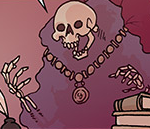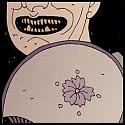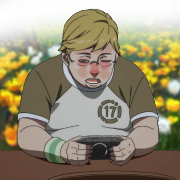|
Failure should always be a good option. Hell, some of my best memories as a player are from botched rolls. So, this is something that undoubtedly comes up a lot because well its a common question and this is a big thread, but I need to ask anyways. How do you guys handle social skills against other PCs? Can a player not bluff another character, and if so exactly how does diplomacy work? Been sort of playing it by ear.
|
|
|
|

|
| # ? Jun 11, 2024 22:18 |
|
If my players wanted to resolve things among themselves with skill rolls I wouldn't keep them from doing it, but I'd encourage pure roleplaying solutions and I'd never call for a social skill check from one PC against another (or any social checks except Bluff on PCs, for that matter). I'm not a big fan of the concept that training in Bluff or Intimidate should get you the opportunity to influence what another character does. Players should work tricky situations out among themselves and remain in full control. Very recent situation from one of my games: one player stole a valuable cloak, the theft was reported to the city watch, and my character is a watchman. This is a scenario with lots of roleplaying potential on both sides, but if the DM allowed the other player a simple Bluff check ("Nope, this is an entirely different cloak." - "Oh, okay then!
|
|
|
|
I'm starting a Call of Cthulhu campaign with a couple of my pals. For the record, I'm using the chaosium system which is really cool and easy. I'm looking for advice on how to really put the fear in my players. We've already played one session now, and while it was enjoyable for everyone, it wasn't outright "scary". I successfully ran a Dread game that managed to really scare my players, but I was wondering if anyone had any useful bits of advice for this setting and system specifically. e: Also, are there any ways to spice up the "research" portions of adventures? Dog Jones fucked around with this message at 13:48 on May 3, 2011 |
|
|
|
The mythos is always vague with its monster descriptions. Let the players imagine how horrible it is. I personally like to focus on the human elements, the cults. I think there's a lot of potential with seeing how far the traitors of humanity have fallen. As for making reading the books exciting I'm not sure.
|
|
|
|
Dog Jones posted:I'm starting a Call of Cthulhu campaign with a couple of my pals. For the record, I'm using the chaosium system which is really cool and easy. Interesting question - I've always found that CoC with dice falls a bit flat, because even if you only have a 1 in 50 chance of <whatever>, you still feel like you have a chance. Dread works better because the system has building tension built into it. As far as creepy goes, I've never gone far wrong with weird little kids or creepy children's songs as motifs. If you can find a creepy version of "Teddy Bear's Picnic" and start playing it at random throughout the session, players can get a little tense. Keep creature descriptions a little vague, but ham them up a bit, like Lovecraft does. Not "You see a weird fish-man" but more "Creeping from the shadows is a blasphemous creature, it's widely spaced eyes look subtly wrong. It's hunched and smells foetid - and what do you see on it's neck? Are those gills?" (Yes, I know this is basic advice, but it's easy to forget to do it). As far as spicing up the research, I've never found a really good way to do it. Making up vaguely creepy desciptions of what's in the texts helps though.
|
|
|
|
The best luck I've had with spicing up research is to simply gloss over it. Make the roll, tell them what they find, move along. Research is always gonna be kind of boring because it's a boring thing to do, even when you're researching abominations that should not be. You can describe what they find in an interesting way, but "you read books" is never gonna be exciting.
|
|
|
|
Oh and try to sell "A fate worse than death." Every rpg has stuff that will kill pcs but corruption and insanity is less fequent, and quick for that matter. You can also play up the element that the mythos is the logical extreme of an existential universe. The creatures are rarely more than just cruelly indifferent and think of humans as just flies to swat aside. This can build a sense of dread, especially if you imply what might happen if these things ever became actually angry at people. I like Hastur because he's depicted as messing with minds for enjoyment, though more methodical than the for shits and giggles way nyarlathotep does it. An immensely powerful thing that enjoys to make things suffer like a childlike cruelty can be pretty intimidating.
|
|
|
|
Gnomebitten posted:Failure should always be a good option. Hell, some of my best memories as a player are from botched rolls. Friends and I roleplay and my GM friend asks for rolls during appropriate times. Of course, sometimes you run into the situation the other guy said about "oh different cloak" but you go along with it since the character doesn't know even if you the player do - just do your best acting it out. This also leads to weird situations when one player isn't as eloquent as another and somehow bluffs or convinces the other, but we roll with it because then my friends who are more conversationally awkward get a chance to shine. Sometimes, I might be put off since I can spin a better story compared to one or two of my other friends, but it's more "fair" this way so we let it roll. This may be different if you play in a gamestore with people who aren't your good friends, however.
|
|
|
|
AlphaDog posted:As far as creepy goes, I've never gone far wrong with weird little kids or creepy children's songs as motifs. If you can find a creepy version of "Teddy Bear's Picnic" and start playing it at random throughout the session, players can get a little tense. I've found that having good atmospheric is one of the most important and easy things you can do to immerse players as a GM. I thing one of the main differences between my scary Dread session and my less scary CoC session was the fact that we were playing CoC over skype, so the players weren't listening to the creepy play lists I had going.
|
|
|
|
Dog Jones posted:I've found that having good atmospheric is one of the most important and easy things you can do to immerse players as a GM. I thing one of the main differences between my scary Dread session and my less scary CoC session was the fact that we were playing CoC over skype, so the players weren't listening to the creepy play lists I had going. As a one-shot where the PCs are all isolated on a derelict spaceship or something -- I'm sure there was an adventure like this in one of the Blood Brothers supplements -- you could use the technology to your advantage, but that's the exception rather than the rule.
|
|
|
|
Dog Jones posted:e: Also, are there any ways to spice up the "research" portions of adventures? It depends on what you want to accomplish. Do you just want to unsettle the players and give them some flavour? Do you want to introduce a quick combat encounter (something like a ghost or a deformed animal or a corpse barely clinging to life or a horde or rats in the walls)? Do you want to breed suspicion among the players? When I used to play, the GM would often mess around with the senses of the PCs doing the investigating. So if the PCs are all in an old study, and some are investigating the room while others are poring over the books, you can make the book-readers start hallucinating. Maybe they start hearing noises from the basement or the attic. Maybe they see figures hovering around their friends. Maybe they see the facial features of their friends suddenly change to something grotesque and then change back. You can draw those basic events out into whatever you want--splitting the group up, dropping them into combat, making them suspect each other, or just unnerving them and reminding them that looking at Cthulhu Mythos stuff will gently caress with them. If you really want to mess with them, write a few of these down ("While you are reading [insert book name here], you are overcome by the suspicion that one of your companions is not what they seem." or "As your eyes grow bleary from staring at the page, you hear an incessant skittering from inside the walls of the house.") and then hand them out to the affected players, giving them the choice to reveal that information or not to their comrades. Maybe some of the other PCs ARE working for the enemy, and maybe not. But the researchers might be a lot more suspicious of them. And maybe there are rats in the walls, and maybe there aren't. The unaffected players might start to worry about the sanity of the affected investigators if it turns out to be nothing. The affected investigators may also start to doubt their own perceptions. One of the best things our GM did was to use the cards sparingly but with regularity. After a while, players stopped being able to tell whether the content of the cards (aka their own perceptions in the game) was something to be trusted or something that was trying to manipulate them. When you threw in the fact that players stopped trusting each other and stopped revealing what was on the cards they got, the research sessions could get very tense, especially later in the game when everyon's sanity is already low.
|
|
|
|
Astfgl posted:It depends on what you want to accomplish. Do you just want to unsettle the players and give them some flavour? Do you want to introduce a quick combat encounter (something like a ghost or a deformed animal or a corpse barely clinging to life or a horde or rats in the walls)? Do you want to breed suspicion among the players? Great advice, definitely gonna try and do something like this during the next adventure I run. I did something similar with the last session. One of the players ate poisoned food and started hallucinating, so I started sending him private messages detailing the things he was seeing. Lots of panicked confusion ensued, and it was loads of fun.
|
|
|
|
It's always fun to push one of the PCs to the point where he believes that he cannot trust his own senses. Keep giving him cards about hallucinations that all prove to be figments of his imagination when he investigates. Then, when he's broken and thinks he's crazy, give him a card that's actually a clue to getting an edge in a combat encounter, or that would help the group avoid a difficult fight altogether. If you've laid the right groundwork, the player will dismiss the info on the card as more of his paranoia, then hopefully reveal to the group after their disastrous fight that he could have prevented the whole thing if he wasn't so erratically crazy. It's a poo poo move for a GM to pull in most games, but I've found stuff like that works well in CoC, especially toward the end of the game when people are at their wits' end.
|
|
|
|
Yawgmoth posted:The best luck I've had with spicing up research is to simply gloss over it. Make the roll, tell them what they find, move along. Research is always gonna be kind of boring because it's a boring thing to do, even when you're researching abominations that should not be. You can describe what they find in an interesting way, but "you read books" is never gonna be exciting. This isn't necessarily true. Here's a good practice for investigation and mystery games: every roll about information leads to useful information, but failed rolls complicate your life. You go to the library to research that strange symbol you found last session, and you make a Research roll or what-have-you. Success? You find what you're looking for. Failure? You still find what you're looking for, but the librarian who helped you find it is one of the cultists you've been trying to avoid. Now they're on to you.
|
|
|
|
Kestral posted:This isn't necessarily true. For us, critical fails had a nasty habit of turning the book hostile. It would start trying to possess or enthrall the reader. You can get out of it with a save roll if you're lazy, or you can tie it to your campaign if you were prepared (maybe that magical talisman the PCs grabbed now has a use, or that cryptic phrase they learned will come in handy). An enthralled investigator might try to attack his companions, or maybe he'll start screaming gibberish and beeline for the cult's headquarters. Maybe he'll collapse after chanting a seemingly random string of numbers, which turn out to be longitudinal coordinates. Maybe those coordinates are where the characters need to go, and maybe it's a trap. Maybe the affected researcher will continue to be affected for the rest of the game.
|
|
|
|
I want to get your opinion on a game world I've been fooling around with. The basic premise is that the campaign world is a devastated planet that was literally cut in half during a battle between gods. An ancient race saved the planet by transmuting the planet's core into a giant crystal machine that somehow holds the two halves together. A giant rift hundreds of miles wide separates the north and south halves of the planet, and this region (the "Sea of Shards") is filled with shards of the planet that float in mid-air. The floating effect is a byproduct of antigravity emissions from the crystal core, and the emissions are blocked by mass. The end effect is that people standing on these shards are subject to normal gravity, but if there's nothing between them and the core then they float in mid air. So basically the players are adventurers who would be exploring the Sea of Shards. The core is unstable and occasionally throws off elemental fragments of itself, and these fragments can have a dramatic effect on the shards they impact. So a shard impacted by a spray of cold core fragments could be an ice world, whereas another shard impacted by acid fragments could be a corrosive bog. What do you think? Does it sound interesting enough to develop?
|
|
|
|
It would basically be run like Sundered Skies which is a similar premise but without the technology level, so yes. http://www.tripleacegames.com/SunderedSkies.php
|
|
|
|
Dog Jones posted:I'm starting a Call of Cthulhu campaign with a couple of my pals. For the record, I'm using the chaosium system which is really cool and easy. On the subject of not-trusting-your-own-senses, I have heard lots of amazing things about the Cthulhu module "Unseen Horrors" (I bought it, and can confirm some of them, even though I have not read the whole thing). I do not want to give it away, of course, for anyone who might want to be surprised/someday play in it.
|
|
|
|
Beer4TheBeerGod posted:So basically the players are adventurers who would be exploring the Sea of Shards. The core is unstable and occasionally throws off elemental fragments of itself, and these fragments can have a dramatic effect on the shards they impact. So a shard impacted by a spray of cold core fragments could be an ice world, whereas another shard impacted by acid fragments could be a corrosive bog. If you threw in some kind of Spelljamming-esque travel mode, I think you'd be on to something.
|
|
|
|
Quarex posted:Though I love the suggestion to have "creepy versions of Teddy Bear's Picnic," we have always found that, as obvious and kind of dumb as it may sound if you have never tried it, turning the lights mostly off and playing by candlelight/glowstick/light in another room (as long as there is enough light to see the character sheets and dice, you are good) is honestly very effective. Not just because it is evocative of the kind of mystery/horror the setting uses, but because most games are not played like that, so it is automatically a little offputting (in the good way). Obviously you know this, since you mentioned doing it with your Dread game, but it never hurts to spell it out for other people. Having a playlist can be very effective, for sure--check the "Music to Game To" thread for good ideas for creepy music. We played Dread once and the GM gave us a small, unreliable electric torch as our only light source for the game. You had to hold the torch as you pulled a block from the tower. It was intense.
|
|
|
|
Brand new to DMing and I'm wondering how I can handle an alignment difference in my party. One player, brand new to D&D mind you, had his heart set on a necromancer. I was reluctant to allow it, but he wouldn't take no for an answer. It's his first time playing and I want all my players to have fun, even if it that makes things harder on me, so I explained to him he'd need to play an evil aligned character if he wanted to cast the vast majority of his school's spells and he understood and rolled lawful evil. That's all well and good but I've no idea how to handle this. One big problem is that the other PCs know he's playing an evil character, and even if they don't metagame and RP properly they'll eventually be clued in in game and it'll have to be dealt with. Besides that what motivation could the necro have for adventuring with the group? Sure I could shoehorn in a reason but what's to stop them from kicking him out of the group once that adventure wraps up (campaign's going to continue indefinitely)? The other PCs are either good or neutral aligned, the rogue (CN) is the closest to the necromancer in terms of alignment.
|
|
|
|
Perry Mason Jar posted:Brand new to DMing and I'm wondering how I can handle an alignment difference in my party. One player, brand new to D&D mind you, had his heart set on a necromancer. I was reluctant to allow it, but he wouldn't take no for an answer. It's his first time playing and I want all my players to have fun, even if it that makes things harder on me, so I explained to him he'd need to play an evil aligned character if he wanted to cast the vast majority of his school's spells and he understood and rolled lawful evil. You can be neutral and still cast evil spells.
|
|
|
|
Who gives a gently caress about alignment? It's the absolute worst of all D&D mechanics and should be ignored. Or killed. With fire. Alignment restrictions are the only thing worse than actual alignment. Just ignore them.
|
|
|
|
Perry Mason Jar posted:Besides that what motivation could the necro have for adventuring with the group? Sure I could shoehorn in a reason but what's to stop them from kicking him out of the group once that adventure wraps up (campaign's going to continue indefinitely)? Off the top of my head, the necromancer realizes that traveling with the party provides an easy way to protect himself while he slowly gets more and more powerful and helping these chumps do their thing is a reasonable sacrifice to make that happen. And yeah, death to alignment. Talk to the rest of the players and try to smooth things over before the game starts, if they're reasonable people they won't give a poo poo
|
|
|
|
who says necromancy is inherently evil?
|
|
|
|
Well, Herodotus, for starters  Fenarisk posted:It would basically be run like Sundered Skies which is a similar premise but without the technology level, so yes. Or Swashbucklers of the 7 Skies, which I heard some good, fate-y things about.
|
|
|
|
Pharmaskittle posted:who says necromancy is inherently evil? Doesn't matter, in-character arguments are the worst way to resolve this. Sit the other players down and tell them "hey, this dude's my friend and he wants to play in this game, he's never played before,let's cut him a little slack." Chances are if anybody really can't accept that, the game's going to crash and burn anyway and that's definitely the most reasonable way to go about this e: didn't mean for that to sound like an ultimatum, more like what you should be arguing. Chances are that if your group seriously just can't work around that fairly reasonable request the game's either going to hit some hardcore drama somewhere down the way and explode or no one's going to want to play after a while, so it's better to find that out now Fungah! fucked around with this message at 05:11 on May 7, 2011 |
|
|
|
Alignment is retarded and anyone who thinks necromancy is inherently evil should be killed and reanimated.
|
|
|
|
Yawgmoth posted:Alignment is retarded and anyone who thinks necromancy is inherently evil should be killed and reanimated. While I am doing my best to develop a reputation in threads like this as "the guy who calmly talks through the pros and cons of every issue," I am pretty well close to being on board with alignment systems being awful. Not even because I find the idea of immutable character-driving-concepts inherently objectionable (D20 Modern's best feature was probably its loyalties mechanic or whatever it was called), but because alignments have never added anything to a game I have played, but rather just occasionally ruined a campaign when someone trying to roleplay non-good (or even chaotic good) just ends up being a jerk and ruining the story.
|
|
|
|
"My village was under attack. The only people left were too old, young, or injured to defend themselves. I knew some spells for raising the dead, from idle hours spent in the library. Reluctantly, I put our honoured dead into service protecting the living." Necromancy is not inherently evil.
|
|
|
|
Yawgmoth posted:Alignment is retarded and anyone who thinks necromancy is inherently evil should be killed and reanimated.
|
|
|
|
Gonna have a Death Knight, a Lich, and a Vampire working together to reforge the ancient lost empire. Legions of ancient soldiers raised from their mass graves, deathless in their fealty to the glorious Holy Empire, driving back the darkness and the untamed wilds. Maybe they can be opposed by a guerrilla kobold resistance, led by a visionary kobold wishing to throw off humanoid oppression and forge his own destiny. But whenever I think of this stuff, I do some reading and find out Eberron did it already.
|
|
|
|
Piell posted:You can be neutral and still cast evil spells. Thanks, I misunderstood the rule for that. Thanks for the advice guys, sounds like he still wants to RP an evil character despite not needing to but the other players should adapt fine.
|
|
|
|
Just make sure he knows that D&D Evil isn't "I eat babies alive and rape children for my dark lord" but more just being selfish. Almost everyone on earth is D&D evil because we put ourselves before others and try to take a bigger slice of the pie when we can, even if that means that someone else gets a little smaller slice.
|
|
|
|
If you need other reasons why this group is working with him, the thing with Lawful Evil is that they do keep their word. So you could go with something like "Yes, he's a fucker, but he's given his word that he's helping #[party's backers] (either because there's a common enemy, or because the necro got caught and did so in order to save his hide) -- so better to have him travel with us so we can at least keep an eye on him, and you never know: we might even have a good influence on him."
|
|
|
|
Long story short, one of my players (who is a prince to a country they are trying to reclaim) has been utterly and completely charmed by a succubus, who escaped the party last time (they actually released her from a prison, so she could go good or bad). He's been scouring the land searching for her as a secondary goal to getting the throne back, and last session he was finally brought within arms reach and will make contact next session. Anyone have any good ideas on where to take this? I can't think of anything remotely fun...
|
|
|
|
I'm afraid to ask, but define 'charmed'.
|
|
|
|
So, I recently volunteered to run a game for a group of dudes who DM non-stop for our local players. These are the lifers, and to a man, great guys. Unfortunately, I really don't have that much experience running games, and they all have at least 25 years under their belts. I could use some help picking a campaign system/style. We usually do High Fantasy and Modern Superheroes/Modern Paranormal. Edit: Reread this. I want to run something other than High Fantasy/Modern Supers. tokenbrownguy fucked around with this message at 04:09 on May 9, 2011 |
|
|
|
RPZip posted:I'm afraid to ask, but define 'charmed'. He's been playing it off like he's found his true love, and since he's a bard he's been singing love songs to this woman since she disappeared.
|
|
|
|

|
| # ? Jun 11, 2024 22:18 |
|
Yarrbossa posted:Long story short, one of my players (who is a prince to a country they are trying to reclaim) has been utterly and completely charmed by a succubus, who escaped the party last time (they actually released her from a prison, so she could go good or bad). He's been scouring the land searching for her as a secondary goal to getting the throne back, and last session he was finally brought within arms reach and will make contact next session.
|
|
|











































